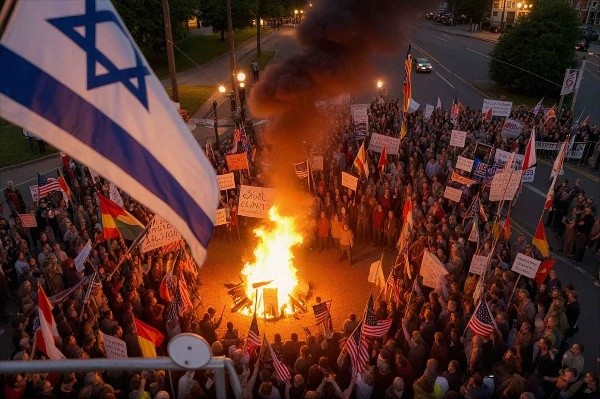Iran’s Plan to Strike Back Against the U.S.
Iran’s Military Preparations Following U.S. Attacks
Loading...

Frustration spills over as thousands of Israelis protest government’s failure to secure the release of captives in Gaza.
Thousands Demand Action from Netanyahu's Government
In a historic display of frustration, approximately 750,000 Israelis have taken to the streets, marking one of the largest protests in the nation’s history. The demonstrators are calling for Prime Minister Benjamin Netanyahu to negotiate a deal for the release of Israeli captives held by Hamas in Gaza. This surge in public outcry follows the recent announcement by the Israeli military that they had recovered the bodies of six hostages from a tunnel in southern Gaza, intensifying the emotional toll on families and the broader community.
The Context of the Protests
The protests come in the wake of a devastating attack on October 7, 2023, when Hamas militants captured around 240 individuals during a surprise assault on southern Israel, resulting in the deaths of at least 1,139 people. Since then, the Israeli military has conducted extensive operations in Gaza, leading to the deaths of over 40,000 Palestinians and widespread destruction of infrastructure. Currently, more than 100 hostages remain unaccounted for, with the Israeli military estimating that about one-third of them may have died during their captivity.
Family members of the captives have expressed their anger towards Netanyahu's government, accusing it of failing to secure a truce that could facilitate the release of their loved ones. The recent recovery of the six bodies has only heightened their sense of urgency and despair.
Record Participation and Continued Demands
Organizers of the protests reported that 500,000 people rallied in Tel Aviv alone, with an additional 250,000 participating in demonstrations across other cities. Many protesters have vowed to continue their efforts until the government responds to their demands. Al Jazeera’s correspondent, Hamdah Salhut, noted that demonstrators are determined to keep the pressure on Netanyahu, who insists that military action remains the primary strategy for securing the captives' return.
At a rally in Tel Aviv, Danielle Aloni, a former captive, addressed the crowd, criticizing Netanyahu's lack of action. She stated, “What kind of forgiveness is that if you do not intend to change your ways?” echoing the sentiments of many who feel abandoned by their leaders.
A Shift in Public Sentiment
The protests reflect a growing recognition among Israelis that a lasting ceasefire may be the only viable solution to the hostage crisis. Libby Lenkinski, vice president for public engagement at the New Israel Fund, highlighted that the number of protesters advocating for a ceasefire has been steadily increasing since late last year. She emphasized that many now understand that a ceasefire is essential for the safe return of the captives.
Data from the Armed Conflict Location and Event Data Project (ACLED) indicates that there have been an average of 113 protests per month across Israel since October 2023, showcasing the sustained public engagement on this issue.
The Government's Response
In response to the mounting pressure, the Histadrut trade union federation has called for a nationwide general strike, signaling widespread discontent with the government's handling of the hostage situation. The strike is expected to disrupt various sectors of the economy, further illustrating the urgency of the situation.
As the protests continue, the Israeli public remains divided on the best course of action. While some support military pressure, others are increasingly advocating for diplomatic solutions to secure the release of hostages. The coming days will be crucial as the government faces unprecedented public scrutiny and demands for accountability in its approach to the ongoing crisis.
BMM - MBA
Iran’s Military Preparations Following U.S. Attacks
Troops remain in five strategic locations, raising fears of renewed tensions and long-term occupation.
Opposition forces have taken control of the capital after a significant offensive. Here is how it unravelled.
